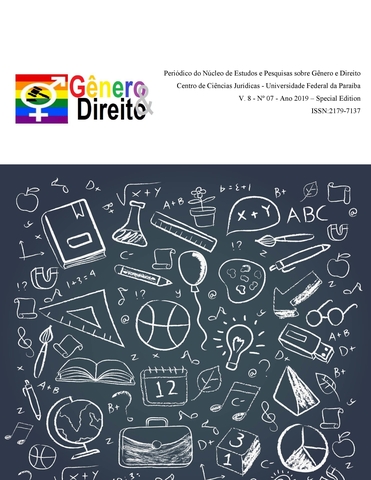DEVELOPMENT OF EDUCATION MANAGER’S PROFESSIONALISM
DOI:
https://doi.org/10.22478/ufpb.2179-7137.2019v8n7.50078Palavras-chave:
educational systems, educational organizations, educational services, education manager, management culture.Resumo
Modernization processes in the sphere of modern Russian education actualize the need to train education managers capable of professional management of innovative development of educational systems. The existing continuous pedagogical education in Russia does not provide for systematic training of education managers to manage the development of educational systems (headteachers, their deputies, methodologists, specialists of education management bodies). Additional professional education (institutions of advanced training and retraining of teachers) partially tries to solve this problem, but the level of this training cannot be sufficient in connection with the new challenges of modernization of education and the development of innovative management technologies. The constantly changing municipal educational space of the region, accompanied by growing needs for the expansion of educational services, makes new demands on educational institutions not only in the preparation of graduates in new specialties, but also in the training of education managers capable of designing innovative development of the educational system. The content foundation of the development system of education manager’s professionalism are: creative development of the theory and experience of domestic pedagogical culture, understanding of traditions and prospects of development of the education system; predicting, designing and implementing innovative changes in the training of education managers to innovations in specific educational institutions.
Downloads
Referências
Abuzjarova M.I. (2018). Tendencies, law of development and economic content of innovative entrepreneurship. Modern Economy Success. Issue. 1. P. 43-50.
Ashmarov I.A. (2018). Some approaches to the study of the USSR’ military economy in the soviet and russian national historiography. Historical Bulletin. Vol. 1. Issue 2. P. 19 – 31.
Aminova D. K., & Tsakhaeva, A. A. (2018). Effective preparation of the future psychologist as one of the elements of the security education system. International Journal of Medicine and Psychology. Vol. 1. Issue 3. P. 40 – 47.
Badakhovа I.T. (2017). Formation of professionally significant qualities of future managers in the training process forming. Modern Scientist. Issue 7. P. 81 – 84.
Bolotin I.S., Mikhaylov A.A., Sorokina N.D. (2017). Functional literacy of students in terms of introduction of information technologies (on the example of research among the students of MAI). Modern Scientist. Vol. 1. Issue 1. P. 160–163.
Borisov V.I. (2018). Influence of the food crisis for the revolution of the working mass of russia in the years of the first world war (August 1914 - February 1917). Historical Bulletin. Vol. 1. Issue 2. P. 49 – 55.
Borisova I.V., Novoseltseva V.N. (2016). Structure features of intelligence of students of different types classe. Modern Science Success. Volume 3. Issue 2. P. 124 – 130.
Borisova M.V., Musokhranov A.Yu., Sidorova N.A. (2018). Use of fitness directions elements on physical education classes and their psychomatic impact on students of the special medical group. Modern Scientist. Issue 1. P. 6 – 9.
Borovikova T.V. (2017). Methodological bases of formation of the intellectual potential of territories in the conditions of innovative economy. Modern Economy Success. Issue 6. P. 46 – 49.
Gadzaov A.F., Dzerzhinskaya M.R. (2018). Mathematical methods of analysis of the periodic components of economic processes. Modern Economy Success. Issue 1. P. 14 – 18.
Gadzhieva U.B. (2018). Socialization of personality as a factor in the mental, intellectual and spiritual-moral development. International Journal of Medicine and Psychology. Vol. 1. Issue 2. P. 17 – 20.
Gasanova P.G., Daudova D.M, Kabieva R.A., Tsahaeva A.A. (2017). Moral qualities of businessmen in public con-sciousness. Modern Scientist. Vol. 1. Issue 1. P. 209 – 211.
Gnatyuk S.N., Pekert N.А. (2018). Education as a factor of sustainable development of agriculture. Russian Economic Bulletin. Vol. 1. Issue 3. P. 18 – 27.
Ilkevich T.G., Medvedkova N.I. (2017). Sports and recreational activities in the art university as a means of prima-ry prevention of occupational diseases of students –artists. Modern Science Success. Vol. 2. Issue 4. P. 29 – 33.
Kryuchkova K.S. (2018) Modular training of future teachers with the use of information technologies in the conditions of virtual academic mobility. Modern Humanities Success. Issue 4. P. 9 – 14.
Kuznetsov A.A., Ignatyeva T.A., Kuznetsov A.O. (2018). Strategy and key elements of competitiveness. Modern Economy Success. Issue 1. P. 25 – 29.
Morozov I.D., Sapozhnick P.A., Pavlov S.M., Rodionova I.P. (2018). Tolerant approach in intercultural communication of students youth. Success Modern Sciences and Education. Issue 1. Р. 34 – 36.
Narkevich, L.V., Narkevich, E.A. (2018). Financial condition analysis in the crisis management system. Russian Economic Bulletin. Vol. 1. Issue 4. P. 10 – 24.
Osipova M.B. (2018). Tendencies of development of educational practice of the modern educational organizations. Modern Humanities Success. Issue 1. P. 10 – 13.
Popov V.P. (2018). Methodological aspects of teaching economic disciplines in a multi-level system of education. Modern Humanities Success. Issue 3. P. 10 – 16.
Schwarzkopf N.V. (2018). Improving the use of data mining technology as a way of reducing credit risk. Russian Economic Bulletin. Vol. 1. Issue 1. P. 10 – 18.
Sergeevа M.G., Trubakova D.I. (2017). Teacher’s Reflection Formation as Factor of Effectiveness Children’s Social Intelligence Forming. Modern Scientist. Issue 7. P. 62 – 64.
Tsahaeva A.A., Aminov U.K., Aminova D.K. (2017). Driving forces of the development of adaptive behavior of personality: methodological considerations. Modern Scientist. Issue 8. P. 44 – 47.
Tsahaeva A.A., Aminova D.K., Aminov U.K. (2016). Patternsize value of the constructs of personality as a subject of scientific reflection. Success of Modern Science and Education. Volume 3. Issue 4. P. 16 – 20.
Zulaeva Ts. A., Maslova S.V., Appaeva Ya.B. (2018). Adaptation of students in the process of continuous educational activity. Success Modern Sciences and Education. Issue 1. Р. 5 – 9

